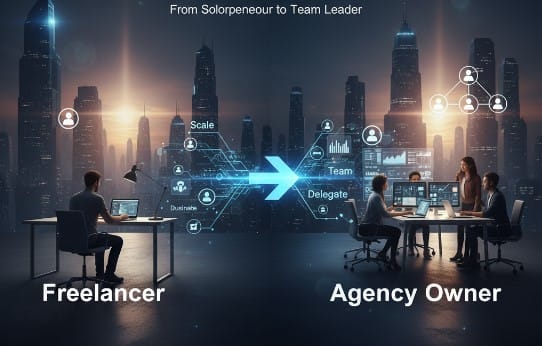Introduction: From Solo Hustle to Scalable Business
Freelancing is exciting—you set your own hours, choose your clients, and work on projects that matter. But as your workload grows, you may start to feel stuck. There’s only so much one person can do.
This is where many freelancers ask themselves: Should I scale into an agency?
Transitioning from freelancer to agency owner isn’t just about hiring more people—it’s about shifting your mindset, building systems, and creating a business that runs beyond you. In this article, we’ll walk through the practical steps, common pitfalls, and real-world strategies to help you make the leap confidently.
Step 1: Shift from Freelancer Mindset to CEO Mindset
As a freelancer, you’re used to doing everything yourself—client calls, design work, invoicing, marketing. But agency owners think differently:
- Freelancer Mindset: “I trade my time for money.”
- Agency Owner Mindset: “I build systems and teams to deliver value at scale.”
👉 Action Tip: Start asking yourself daily: “Would a CEO do this task, or would they delegate it?”
Step 2: Define Your Niche and Services
Agencies succeed by being clear and specialized, not by trying to serve everyone. Ask:
- What service do clients keep hiring me for?
- What niche or industry do I understand best?
- Can I package my skills into a repeatable offer?
👉 Story Example: A freelance copywriter I know stopped offering “anything writing” and built an agency focused solely on email marketing for e-commerce brands. That clarity allowed her to scale quickly.
Step 3: Build Systems Before You Build a Team
Hiring without systems is chaos. You’ll waste time explaining processes over and over. Instead, document how you work:
- Templates for proposals and contracts.
- Step-by-step SOPs (Standard Operating Procedures).
- Project management tools (Asana, Trello, ClickUp).
👉 Action Tip: Record screen tutorials (with Loom) while doing your work. This becomes instant training material for future hires.
Step 4: Start Small with Contractors
You don’t need to hire 10 employees right away. Start with trusted freelancers or part-timers who can take off the tasks that drain you most.
- Need more design output? Hire a junior designer.
- Drowning in admin? Hire a VA (virtual assistant).
- Spending too much on client outreach? Hire a sales rep.
👉 Pro Tip: Hire for the role you hate doing first—that’s where you’ll see the biggest relief and growth.
Step 5: Upgrade Client Management
Agencies need to manage multiple projects at once, which means communication and expectations matter more than ever.
- Use a CRM (HubSpot, Pipedrive, Notion).
- Set clear client onboarding and reporting processes.
- Charge retainers instead of one-off projects for stability.
👉 Example: A freelance web developer who switched to retainers found that clients stayed longer and revenue became more predictable—essential when paying a team.
Step 6: Learn Leadership, Not Just Skills
Running an agency isn’t just about being good at your craft—it’s about leading people. You’ll need to:
- Give feedback without micromanaging.
- Inspire your team to stay motivated.
- Handle conflict and client escalations calmly.
👉 Action Tip: Start reading leadership books (e.g., Leaders Eat Last by Simon Sinek) and practicing soft skills, not just technical ones.
Step 7: Grow Revenue Intentionally
As a freelancer, doubling income often means doubling hours. As an agency, you grow by:
- Raising prices as your agency builds credibility.
- Offering tiered packages (basic, premium, enterprise).
- Expanding services that clients are already requesting.
👉 Story Example: A freelance social media manager turned agency owner increased revenue by 4x in a year simply by packaging services into monthly retainers with upsells.
Challenges You’ll Face (And How to Handle Them)
- Loss of Creative Control: At first, letting go of tasks feels scary. Solution: Set quality standards but trust your team.
- Cash Flow Stress: Payroll is a new responsibility. Solution: Always keep a 3–6 month buffer.
- Imposter Syndrome: Many freelancers doubt if they’re “ready.” Solution: Remember—every big agency started as a one-person shop.
Conclusion: You’re Ready to Lead the Next Chapter
Transitioning from freelancer to agency owner is one of the most rewarding steps you can take. It allows you to:
- Stop trading time for money.
- Build a scalable business.
- Create opportunities for others while building your own freedom.
It won’t be easy, but with the right mindset, systems, and team, you can grow from a solo hustler into a thriving CEO.
🔑 Question for You: What’s the first task you’d delegate today if you started your agency tomorrow?
Light CTA:
If you found this guide useful, share it with a fellow freelancer—or subscribe to get weekly strategies on freelancing, scaling, and building digital income streams that last into 2026 and beyond.


